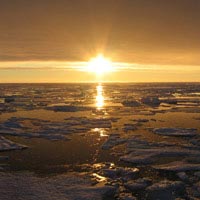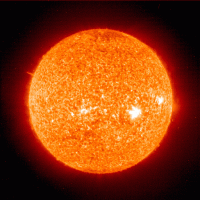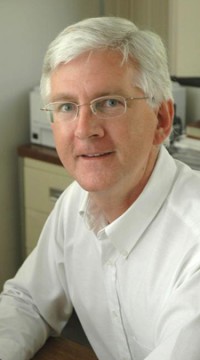
|
Nov 14, 2007
NASA Sees Arctic Ocean Circulation Do An About-Face
By JPL/NASA, Pasadena, CA
A team of NASA and university scientists has detected an ongoing reversal in Arctic Ocean circulation triggered by atmospheric circulation changes that vary on decade-long time scales. The results suggest not all the large changes seen in Arctic climate in recent years are a result of long-term trends associated with global warming. “Our study confirms many changes seen in upper Arctic Ocean circulation in the 1990s were mostly decadal in nature, rather than trends caused by global warming,” said Morison. While some 1990s climate trends, such as declines in Arctic sea ice extent, have continued, these results suggest at least for the ‘wet’ part of the Arctic—the Arctic Ocean—circulation reverted to conditions like those prevalent before the 1990s,” he added. During its strong counterclockwise phase in the 1990s, the Arctic environment changed markedly, with the upper Arctic Ocean undergoing major changes that persisted into this century. Many scientists viewed the changes as evidence of an ongoing climate shift, raising concerns about the effects of global warming on the Arctic. Read more here.

Nov 11, 2007
It’s All About the Sun
By Lawrence Solomon, Financial Post
Climate Change by Jupiter
The alignment of the planets, and especially that of Jupiter and Saturn, control the climate on Earth. So explained Rhodes Fairbridge of Columbia University, a giant in science over much of the last century whose accomplishments are perhaps unsurpassed for their breadth, depth, and volume. This one man authored or co-authored 100 scientific books and more than 1,000 scientific papers, he edited the Benchmarks in Geology series (more than 90 volumes in print) and was general editor of the Encyclopaedias of the Earth Sciences. He edited eight major encyclopedias of specialized scientific papers in the atmospheric sciences and astrogeology; geomorphology; geochemistry and the earth sciences; geology, sedimentology, paleontology, oceanography and, not least, climatology
Changes in sunspots and other solar activity, scientists have realized for more than two centuries, correlate closely with the climate of Earth, explaining the ice ages and periods of great warming.

But what, Dr. Fairbridge wondered, causes these changes in our sun? The sun’s own orbit, he found, has eight characteristic patterns, all determined by Jupiter’s position relative to Saturn, with the other planets playing much lesser roles. Some of these eight have orderly orbits, smooth and near-circular. During such orbits, solar activity is high and Earth heats up. Some of the eight orbits are chaotic, taking a loop-the-loop path. These orbits correspond to quiet times for the sun, and cool periods on Earth. Every 179 years or so, the sun embarks on a new cycle of orbits. One of the cooler periods in recent centuries was the Little Ice Age of the 17th century, when the Thames River in London froze over each winter. The next cool period, if the pattern holds, began in 1996, with the effects to be felt starting in 2010. Some predict three decades of severe cold. Read more here. See also the Icecap All About Climate review of this issue here and here.
Nov 09, 2007
Comments on the UK Author of Global Warming Story Hoax Who Spoke Out
By Roy Spencer, Principal Research Scientist at the University of Alabama in Huntsville
An anonymous Brit has now admitted in a brief interview that he wrote the fake global warming research paper which is claimed to have fooled some of us “global warming skeptics”. His stated purpose was to “expose the credulity and scientific illiteracy of many of the people who call themselves climate sceptics”.
I would argue that he has done just the opposite. Several of us (scientists and non-scientists alike) were able, within a matter of seconds to minutes, to identify the paper as a fake. We then spread the word, warning others of the hoax. Therefore, we showed that we do not, as the hoaxer claims, “believe almost anything if it lends support to their position”. We did exactly the opposite.
In contrast, the hoaxer himself shows that he continues to believe in urban legends. To the inteviewer’s question: “Do you think humanity is to blame for the current observed warming?”, the hoaxer replied, “Yes. The science could scarcely be clearer”.
This myth continues despite the fact that there have been NO scientific papers published with evidence that our current warmth is not due to natural climate variability, e.g., a small change in cloudiness, or precipitation efficiency, or general circulation of the atmosphere, or a variety of other possible explanations that do not involve manmade greenhouse gas emissions. Thus, I would say that not only did the hoaxer’s attempt fail, he would do well to be a little more discerning about scientific claims from politicians and actors. Read more here.

Nov 09, 2007
What is Wrong with the IPCC?
By Hans H.J. Labohm, Independent Economist in a Special SPPI Report
In the international discussion about climate change, which is now going on for almost twenty years, the IPCC has played a questionable role. From its inception, is has almost exclusively focused on the AGW hypothesis, while systematically ignoring alternative hypotheses. Some main points of criticism of the IPCC include: The hypothesis that an increased CO2 concentration in the atmosphere will lead to a rise in temperature has not been proven and is even at odds with the observations. Satellite-based temperature measurements show that the earth has warmed a few tenths of a degree Celsius between 1979 and 1998. It is not likely that this is caused by mankind. There is still a lack of scientific understanding, required to model all assumed radiative forcings. The most important one, for which there are not sufficient quantitative data to date, is the variable impact of clouds.
Climate models, which are being used to achieve a better understanding of the climate system, are not suited to serve as basis for predictions. This is, inter alia, related to the stochastic nature of climate. The global climate is very much determined by extra-terrestrial phenomena, of which the fluctuation of sun activity is the most important. Should there still be global warming in the future, for which there are only model based indications, then mankind will not be able to do something about it. Moreover, also according the IPCC, a modest additional warming (e.g., of 2 degrees Celsius) will on balance be beneficial for mankind. The IPCC has ignored the climate projections of astrophysicists, which suggest global cooling. The advent of climate alarmism, fueled by statements of many prominent politicians and the media, has no scientific justification. Many catastrophic consequences of climate change, such as floods and extreme weather events, have been predicted, which are not based on scientific knowledge. Especially the European governments have opted for a climate policy which is completely unrealistic and results in a massive waste of scarce resources. Finally, one should not discount the possibility that the average global temperature will fall considerably in the near future. This might have harmful implications, as opposed to a modest rise of temperatures, which on balance will have positive effects.
Read more of this excellent SPPI paper here.
Nov 02, 2007
‘Global Warming’ as Pathological Science
By James Lewis, American Thinker
There is such a thing as pathological science. Science becomes unhealthy when its only real question --- “what is true?” --- is sabotaged by vested interests, by ideological Commissars, or even by grant-swinging scientists. Today’s Global Warming campaign is endangering real, honest science. Global Warming superstition has become an international power grab, and good science suffers as a result.
Freeman Dyson, one of the great physicists (Princeton University) alive today, put it plainly enough in his autobiography:
“...all the fuss about global warming is grossly exaggerated. Here I am opposing the holy brotherhood of climate model experts and the crowd of deluded citizens who believe the numbers predicted by the computer models. ... I have studied the climate models and I know what they can do. ... They do a very poor job of describing the clouds, the dust, the chemistry and the biology of fields and farms and forests. They do not begin to describe the real world that we live in.” Read more here.
|
|
|
|





